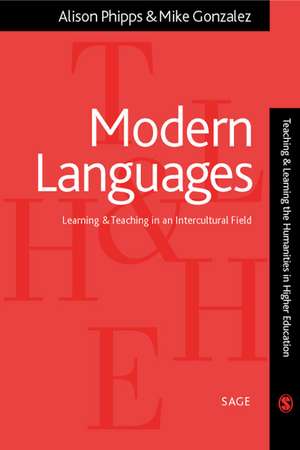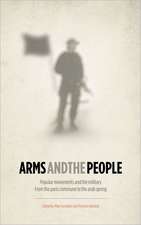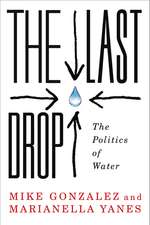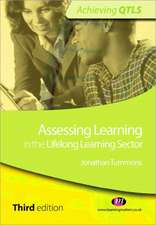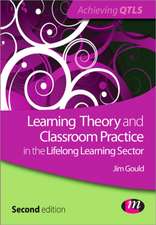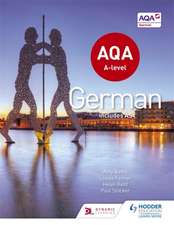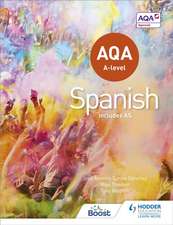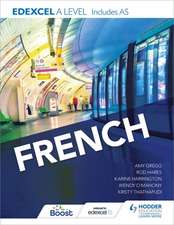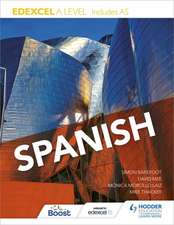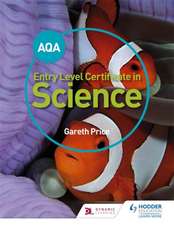Modern Languages: Learning and Teaching in an Intercultural Field: Teaching & Learning the Humanities in HE series
Autor Alison Phipps, Mike Gonzalezen Limba Engleză Paperback – 6 apr 2004
'Every so often a book comes along filled with so much wisdom, critical insight, and sheer humanity that it takes one's breath away. Modern Languages is such a book. Reclaiming language as both a site of struggle and a crucial sphere of politics, Alison Phipps and Mike Gonzalez make it clear that matters of language lie at the heart of any viable pedagogy in which democracy matters. But not a language(s) drained of critical possibilities, passion, power, or imagination, but language as the context and medium in which meaning is produced, affective investments made, and experiences are given legitimacy. Any educator, parent, student, or citizen of the world who cares about democracy, pedagogy, and the crucial role of modern languages creating the conditions for agency, politics, and, yes, hope should read this book' - Professor Henry Giroux, Waterbury Chair, Penn State University, USA
'I expect it will become a much-thumbed handbook for teachers in search of inspiration, and I am sure it will be a catalyst to further debate and exploration. But I suspect it may also become a turning point for thinking about modern languages. This book exudes life and hope. It shows a future where languages can thrive because they are an integral and indispensable part of what it means to be human. It is an exhilarating prospect to help to bring that future closer' - Professor Michael Kelly, Director, Subject Centre for Languages, Linguistics and Area Studies, University of Southampton
'Modern Languages is argumentative in the best sense: it is intellectually ambitious and is making a bold and brave argument of its own. The story is exciting, and offers a radical way of reconceiving teaching and learning in languages. It is written with evident passion and conviction and it seeks to reach out to an audience. The authors come across as committed and even as brilliant teachers. This is a book for its age but yet may have a long shelf-life. It has made me think about modern languages and language teaching and learning in quite new ways' - Professor Ronald Barnett, Institute of Education, University of London
'This book pushes the traditional field of Modern Languages into new challenges and it crosses intradisciplinary borders between different languages and cultures. It is intrinsically about languaging and about being intercultural. The authors argue that languages are "a social justice issue", give voice to language users in general and to language students in particular and engage into powerful, erudite, reflexive and critical insights. This book portrays language and culture education as a passionate, intelligent and committed undertaking. In sum, it is essential and stimulating reading for those Language and Culture educators, teaching in Modern Language Departments from universities all over the world, who dare' - Dr Manuela Guilherme, Researcher, Center for Social Studies, Universidade de Coimbra
This accessible book aims to challenge and stimulate all those engaged with teaching modern languages in higher education. It is not a `how to' book; rather it engages with the complex, often paradoxical position of modern languages today, and offers arguments for, and illustrations of the ways in which teachers of modern languages can position themselves critically in that rapidly changing context. It works with the concepts of languaging and being intercultural, which arise from a rigorous examination of research findings, a challenging critique of current models of work within the discipline and a reflection on existing teaching practices.
Beginning with an examination of the 'crisis' in modern languages in the U.K. and North America, the authors draw on data and descriptions of learning experiences in the field and position themselves critically within the debates. Key problems for teachers and learners are identified and elaborated through examples of critical incidents which point to generic as well as specific issues and solutions in teaching languages in higher education.
The Teaching & Learning in the Humanities series, edited by Ellie Chambers and Jan Parker, is for beginning and experienced lecturers. It deals with all aspects of teaching individual arts and humanities subjects in higher education. Experienced teachers offer authoritative suggestions on how to become critically reflective about discipline-specific practices.
Preț: 440.28 lei
Preț vechi: 517.97 lei
-15% Nou
Puncte Express: 660
Preț estimativ în valută:
84.25€ • 87.05$ • 70.09£
84.25€ • 87.05$ • 70.09£
Carte tipărită la comandă
Livrare economică 19 martie-02 aprilie
Preluare comenzi: 021 569.72.76
Specificații
ISBN-13: 9780761974185
ISBN-10: 0761974180
Pagini: 208
Dimensiuni: 156 x 234 x 14 mm
Greutate: 0.35 kg
Ediția:First Edition
Editura: SAGE Publications
Colecția Sage Publications Ltd
Seria Teaching & Learning the Humanities in HE series
Locul publicării:London, United Kingdom
ISBN-10: 0761974180
Pagini: 208
Dimensiuni: 156 x 234 x 14 mm
Greutate: 0.35 kg
Ediția:First Edition
Editura: SAGE Publications
Colecția Sage Publications Ltd
Seria Teaching & Learning the Humanities in HE series
Locul publicării:London, United Kingdom
Recenzii
`This is an important book. A very important book. It is important because it both challenges traditional understandings of language teaching and learning in universities, and rejects new understandings which only devalue the potential power of language learning…. This is not, however, merely a critique. The authors offer a compelling alternative, and do so in a language and style which mirror the alternative proposed…. The authors illustrate their ideas through snapshots of classroom practices which help to build up a picture of what is meant. Such illustrations are invaluable' - Teaching in Higher Education
From the Foreword
`In some respects the authors propose a utopian vision, but a practical utopia, which shows that it is possible to step outside the well-worn frameworks of thought and practice. New and different ways of teaching and learning are demonstrated and argued for in chapter after chapter, addressing almost every aspect of the modern languages experience. Most teachers (and many learners) will recognise the problems to which the authors propose imaginative solutions, and most will put the book down reluctantly, feeling energised by the ideas they have found. I expect it will become a much-thumbed handbook for teachers in search of inspiration, and I am sure it will be a catalyst to further debate and exploration. But I suspect it may also become a turning point for thinking about modern languages. This book exudes life and hope. It shows a future where languages can thrive because they are an integral and indispensable part of what it means to be human. It is an exhilarating prospect to help to bring that future closer' - Michael Kelly, Director, Subject Centre for Languages, Linguistics and Area Studies, University of Southampton
‘Every so often a book comes along filled with so much wisdom, critical insight, and sheer humanity that it takes one's breath away. Modern Languages is such a book. Reclaiming language as both a site of struggle and a crucial sphere of politics, Alison Phipps and Mike Gonzalez make it clear that matters of language lie at the heart of any viable pedagogy in which democracy matters. But not a language(s) drained of critical possibilities, passion, power, or imagination, but language as the context and medium in which meaning is produced, affective investments made, and experiences are given legitimacy. Any educator, parent, student, or citizen of the world who cares about democracy, pedagogy, and the crucial role of modern languages creating the conditions for agency, politics, and, yes, hope should read this book’ - Professor Henry Giroux, Waterbury Chair, Penn State University, USA
‘I expect it will become a much-thumbed handbook for teachers in search of inspiration, and I am sure it will be a catalyst to further debate and exploration. But I suspect it may also become a turning point for thinking about modern languages. This book exudes life and hope. It shows a future where languages can thrive because they are an integral and indispensable part of what it means to be human. It is an exhilarating prospect to help to bring that future closer’ - Professor Michael Kelly, Director, Subject Centre for Languages, Linguistics and Area Studies, University of Southampton
‘Modern Languages is argumentative in the best sense: it is intellectually ambitious and is making a bold and brave argument of its own. The story is exciting, and offers a radical way of reconceiving teaching and learning in languages. It is written with evident passion and conviction and it seeks to reach out to an audience. The authors come across as committed and even as brilliant teachers. This is a book for its age but yet may have a long shelf-life. It has made me think about modern languages and language teaching and learning in quite new ways’ - Professor Ronald Barnett, Institute of Education, University of London
‘This book pushes the traditional field of Modern Languages into new challenges and it crosses intradisciplinary borders between different languages and cultures. It is intrinsically about languaging and about being intercultural. The authors argue that languages are “a social justice issue”, give voice to language users in general and to language students in particular and engage into powerful, erudite, reflexive and critical insights. This book portrays language and culture education as a passionate, intelligent and committed undertaking. In sum, it is essential and stimulating reading for those Language and Culture educators, teaching in Modern Language Departments from universities all over the world, who dare’ - Dr Manuela Guilherme, Researcher, Center for Social Studies, Universidade de Coimbra
"The language is easily accessible and fluent. Arugments are presented cohesively and, above all, with passion. Indeed, I find it refreshing to read theoretical discussions based on individual commitment rather than just on well-established theories. Modern Languages is, therefore, not trying to 'teach' us anything but to raise awareness, ask questions and challenge traditional ways of perceiving complex issues... A lively, stimulating and thought-provoking read."
"The qualities of languaging evident in the volume are remarkable. The format of the book is unique in that the exposition of theoretical stances and comment thereon is interspersed with a variety of narratives in which the principles outlined are brought to life with reference to particular experiences."
From the Foreword
`In some respects the authors propose a utopian vision, but a practical utopia, which shows that it is possible to step outside the well-worn frameworks of thought and practice. New and different ways of teaching and learning are demonstrated and argued for in chapter after chapter, addressing almost every aspect of the modern languages experience. Most teachers (and many learners) will recognise the problems to which the authors propose imaginative solutions, and most will put the book down reluctantly, feeling energised by the ideas they have found. I expect it will become a much-thumbed handbook for teachers in search of inspiration, and I am sure it will be a catalyst to further debate and exploration. But I suspect it may also become a turning point for thinking about modern languages. This book exudes life and hope. It shows a future where languages can thrive because they are an integral and indispensable part of what it means to be human. It is an exhilarating prospect to help to bring that future closer' - Michael Kelly, Director, Subject Centre for Languages, Linguistics and Area Studies, University of Southampton
‘Every so often a book comes along filled with so much wisdom, critical insight, and sheer humanity that it takes one's breath away. Modern Languages is such a book. Reclaiming language as both a site of struggle and a crucial sphere of politics, Alison Phipps and Mike Gonzalez make it clear that matters of language lie at the heart of any viable pedagogy in which democracy matters. But not a language(s) drained of critical possibilities, passion, power, or imagination, but language as the context and medium in which meaning is produced, affective investments made, and experiences are given legitimacy. Any educator, parent, student, or citizen of the world who cares about democracy, pedagogy, and the crucial role of modern languages creating the conditions for agency, politics, and, yes, hope should read this book’ - Professor Henry Giroux, Waterbury Chair, Penn State University, USA
‘I expect it will become a much-thumbed handbook for teachers in search of inspiration, and I am sure it will be a catalyst to further debate and exploration. But I suspect it may also become a turning point for thinking about modern languages. This book exudes life and hope. It shows a future where languages can thrive because they are an integral and indispensable part of what it means to be human. It is an exhilarating prospect to help to bring that future closer’ - Professor Michael Kelly, Director, Subject Centre for Languages, Linguistics and Area Studies, University of Southampton
‘Modern Languages is argumentative in the best sense: it is intellectually ambitious and is making a bold and brave argument of its own. The story is exciting, and offers a radical way of reconceiving teaching and learning in languages. It is written with evident passion and conviction and it seeks to reach out to an audience. The authors come across as committed and even as brilliant teachers. This is a book for its age but yet may have a long shelf-life. It has made me think about modern languages and language teaching and learning in quite new ways’ - Professor Ronald Barnett, Institute of Education, University of London
‘This book pushes the traditional field of Modern Languages into new challenges and it crosses intradisciplinary borders between different languages and cultures. It is intrinsically about languaging and about being intercultural. The authors argue that languages are “a social justice issue”, give voice to language users in general and to language students in particular and engage into powerful, erudite, reflexive and critical insights. This book portrays language and culture education as a passionate, intelligent and committed undertaking. In sum, it is essential and stimulating reading for those Language and Culture educators, teaching in Modern Language Departments from universities all over the world, who dare’ - Dr Manuela Guilherme, Researcher, Center for Social Studies, Universidade de Coimbra
"The language is easily accessible and fluent. Arugments are presented cohesively and, above all, with passion. Indeed, I find it refreshing to read theoretical discussions based on individual commitment rather than just on well-established theories. Modern Languages is, therefore, not trying to 'teach' us anything but to raise awareness, ask questions and challenge traditional ways of perceiving complex issues... A lively, stimulating and thought-provoking read."
"The qualities of languaging evident in the volume are remarkable. The format of the book is unique in that the exposition of theoretical stances and comment thereon is interspersed with a variety of narratives in which the principles outlined are brought to life with reference to particular experiences."
Cuprins
The Politics of Languages
Signs of Belonging
Culture in Pieces
Culture and beyond
Languaging Matters
Languaging in Time and Place
Being There
Resonant Reading
Living in Translated Worlds
Being Intercultural
Signs of Belonging
Culture in Pieces
Culture and beyond
Languaging Matters
Languaging in Time and Place
Being There
Resonant Reading
Living in Translated Worlds
Being Intercultural
Notă biografică
My research interests focus on languages and intercultural studies, with a particular critical concern for the different ways in which people learn to live and communicate together by stepping outside comfortable or familiar contexts. My work is interdisciplinary and draws on the resources of social and cultural anthropology, theatre and cultural studies, theology, law, modern languages and education. My Ph.D. research and ethnographic training focused on open air community theatre in Germany. I have continued ethnographic work among tourists, modern language students, adult learners of tourist languages, in conflict zones and among sanctuary and asylum seekers, refugees and befrienders. At present I am developing research on languages and intercultural advocacy with asylum seekers and refugees; and through intercultural workshops on education for peace and non-violence with a growing focus on constructions of faith and on the contribution of theological perspectives. I am a published poet and bring poetic approaches to bear on much of my work.
I was voted ¿Best College Teacher¿ by students and awarded the Student representative Council¿s first Prize for Excellent Teaching in 2011. In the same year I was given a ¿Teaching Excellence Award¿ for a career distinguished by a commitment to significant and sustained excellence at the University of Glasgow. In 2012 I was awarded an OBE for services to Education, and Intercultural and Interreligious Relations in the Queen¿s Birthday Honours. Click here for a full biography
Together with Rebecca Kay I co-convene the Glasgow Refugee, Asylum and Migration Network, a knowledge exchange research network based at the University of Glasgow.
Descriere
This accessible book is written by teachers of modern languages and tackles the specifics of the discipline while situating it within the literature on teaching Modern Languages in Higher Education.
